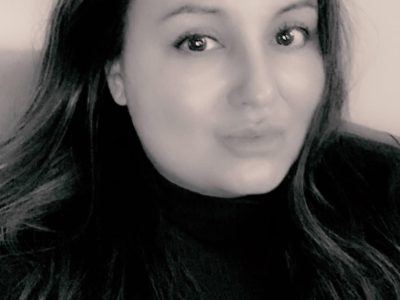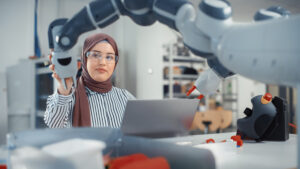
Leading the Centres for Enablement at Bupa, Elle Anderson is a senior leader in digital transformation, with a 20-year career in product and agility that has helped shift the dial on how and why we do things in our daily lives through some of the world’s biggest brands.
She discusses the unexpected opportunities that a career led by one key trait- curiosity- can offer and why changing how we invest our daily time is her passion.
How did you get into the tech space and why?
In high school, I wanted to be a writer, but my aunt and uncle were both working as technical writers for an analytics firm in my home state. They discussed some of the different options available in the world of work, so I had that foundation about bringing soft skills with harder ones in tech. My parents were strong advocates for university, but stressed the importance of obtaining tangible skills for employability. I didn’t grow up in a well-to-do family, so I felt a huge amount of ownership in ensuring a return on investment from whatever I pursued. I had taught myself COBOL, Visual Basic, HTML and CSS, and I’d learned from my aunt and uncle that translation of very technical things in a non-technical way was an emerging skillset and one that would mean I’d always have work, no matter what my specialism ended up being.
So, when I graduated, I became a developer and joined a consultancy as an analyst. I was very good at explaining technical things to non-technical people and bridging the gap between business and tech. That’s how I ended up in product ownership roles, translating esoteric things from a customer’s or a client’s view into something that we can build.
Why is product your passion?
At my heart, I am a professional problem-solver. I feel lucky to have been a young person in the early dot com boom and watching as we pivoted customer behaviours in Web2. I’m sure many people feel technology has been detrimental to us in some ways, but I am whimsical about the way that we have solved for the increasing stress that has been put on us a whole. Society has evolved around us to the point where families, and women in particular, had to do many different things well and not drop the bar on any of them. The expectations on us, from running a household to getting stuff done in our personal lives- didn’t stop. Modern life has just kept adding things on. It’s about managing the investment of the time that we have to do the things we do in the most equitable and profitable way possible. When I was working at Domino’s Pizza in 2009, for example, people traditionally liked phoning up to order a pizza and being able to pick it up. They didn’t think registering an online account from the computer in their study was helpful, but then they realised there was something else they could be doing with that 30 minutes. And if you look across any part of life, whether it’s buying food or getting our children to school, we are not looking for shortcuts, necessarily, but ways to do all the things expected of us in a quality way and with integrity. Technology enables that. Over time, technology embraced the concept of product management and coupled value proposition with the underlying technology required to bring it to people through digital channels. It is a science of its own, and getting to experiment with behaviour change and improve the day-to-day experience for normal people is very rewarding.
What are the milestones that have driven you forward?
Owning a transformation early on in a role at a major credit card company was a huge milestone for me. I am a product person, and usually, when research has been done on customer pain points and inefficiencies, I’m brought into a company because there are outcomes they want to achieve through digital products. But it’s not just a product you buy; it’s something a customer will interact with and that back office teams will have to interact with, own, and support. Working in this role was the first time I got to see things, not just from a customer perspective but from the two-sided coin of business change. I always look for that angle first in product transformation because if I can solve a wicked problem and achieve business and customer value, then that is good business for everyone.
What are you most proud of in your career?
It still makes me beam with pride to tell people that if you’ve ever ordered a pizza on the Domino’s app, checked in for a GP appointment in the UK, have a Capital One credit card or used LEGO Find my Brick, those were my apps. To discover, deliver, and grow products is intensely rewarding, but to know that these small behavioural changes in society exist and have stood the test of time still today.
What is your role at Bupa?
I’ve been at Bupa for 14 months as Group Head of Digital Centres of Enablement. A Centre for Enablement is an internal consulting arm that helps write patterns, architectures, assets, artefacts and best practices or even just create proofs of concept that are scalable and reusable worldwide. We have experts building products, helping us make an informed and appropriate use of AI and how we manage and engineer our data differently. In addition to a team of 11, we have monthly meetups where each community (AI, Cloud, Data, Digital, and Agile) share what they are solving for, what’s working, how they’re approaching customer problems, and how our customer problems are rather similar even in different businesses within Bupa. We recently found synergies from Dental in Asia Pacific with Care Home pain points in the UK, for example. It’s a regular forum to showcase experiments, iterations, and what we are learning from our customers so that we can scale our transformation and hopefully avoid reinventing the wheel. Are these learnings transferable to a different type of customer in the healthcare industry? People get excited when they talk about Centres for Enablement as an internal global conference for Bupa. Ultimately, it’s about knowledge transfer and a network of talented people to leverage when problem-solving. My team and I are proud to have trained close to 1000 people in methods from the Lean, Agile, SecDevOps, and Product Management family of practices. It’s been a huge reward for me personally, as this time around, instead of being Product Director for one major product, I’ve been Director of Product Transformation, enabling multiple product teams to reimagine healthcare, our ways of working, and bring immense value as we delight our customers.
What’s the biggest opportunity in the digital transformation of Bupa healthcare?
As with most companies today, our biggest opportunity is the shift towards seeing each potential or current customer as a whole and navigating many service offerings and products. By becoming customer-obsessed, we aim to see the individual at the heart of navigating what we aim to become a frictionless experience in managing their health. It’s enabling better, clear, concise navigation from policy coverage to our full range of healthcare offerings and caring about the full picture of the needs of that individual, not just as they navigate single service offerings but in the end-to-end thinking as they ascertain ‘what am I covered for from my policy? Or what can I self-refer into versus getting referred?’ Again, it’s about making things more frictionless, intuitive and supportive. Our goal in this transformation is to become the world’s most customer-centric healthcare company, looking at the full experience for the individual both for proactive people curious about what is covered so they can take advantage of the full breadth of their plans and as they navigate clinical pathways and treatment, whilst feeling human in the process, and where paperwork, payment, and hassle is minimised.
What skills mark someone out for an exceptional career in tech?
Technology used to be its own thing, but at this point, it is now simply a pillar of most things, and I don’t think there is a line between what would be considered a classic non-technical profession and tech. I used to give a talk to the Girl Guides, where my key message was that technology is a community, and in good communities, you need multiple skill sets to make things work. Today, there are deep tech roles where you must code or use applied mathematics, which have such complexity to them that maybe they are in their own genre now. But we also need creatives and artistic people. When I’m looking for a more innovative, inspiring way for a customer to engage with my digital products, it can be those who, in a different lifetime, would have been a sculptor or a painter and the unique way they think and birth ideas who make awesome products happen.
What has been your own return for your investment in a digital career?
If you are curious and interested in how things work, then this world can open up doors you could not have even thought to knock on. I’ve found my career most fascinating whenever I’ve had to look at it, from seeking out why we do the things we do and why they become a part of our inner rhythm. My career in tech has encouraged me to think big, admit that I don’t know everything, and feel that it’s completely acceptable for me to pull up a chair and be a seeker. By accepting the calling to be a lifelong learner, I have gained a wonderfully rewarding career in the US, UK, and Europe. I’ve travelled and understood more about the human condition, about needs and pains, and how we can be both different and rather the same across cultures. I couldn’t be more grateful for my career.
How would you advise someone to build a career in tech in a way that feels authentic and can also keep pace with technology?
To deliver anything important, meaningful and valuable to anyone, you have to really understand what you bring to the table. At my core, I know I’m prepared to read, digest, and reflect and am willing to gain a grasp on things well enough to teach others, translate them or be open-minded to the idea that I could be wrong. That ability to be a conduit for information is my skill set. Think about what naturally flows through you. What is your thing? Lean into that, and a career will emerge, not several paths, actually. To be a young person in 2023 is to have the resources of LinkedIn, X and YouTube, where you can approach anyone in the world and say, ‘I’m struggling to find my thing’. Most of us remember how that feels, and we remember the people who helped us, so talk to and ask as many questions of different people as possible. You may find, as I did, that there’s this random profession that you never dreamed of in which you can use those gifts in an outside-the-box way.



